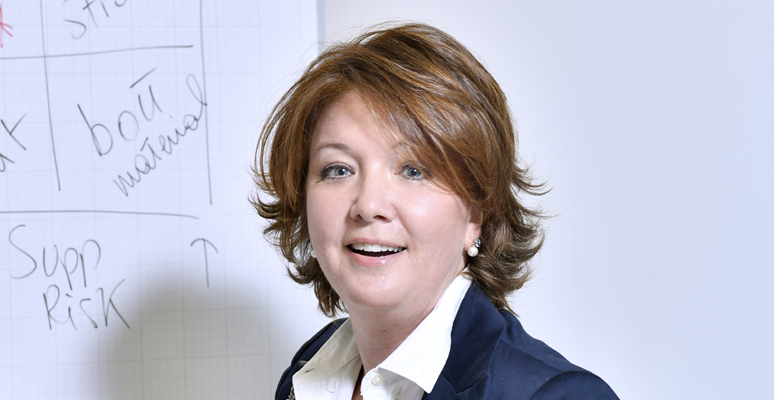The Future of F&B: the ingredients of a recipe to come
An interview about food & beverage, especially if set in Italy, is like saying “a few quick thoughts about the universe”. The extent and variety of this world is indubitable: the merchandise divisions are extremely diverse, and the manufacturing, commercial and service activities are widely different one from the other. Vittoria Veronesi, Director of the MFB - Master of Management in Food & Beverage, is keenly aware of this, and yet she can identify a few common trends within F&B businesses and can define a portfolio of specific skills needed by all the managers who operate within them. It is a global look towards the future of F&B and its satellite industries, keeping in mind Italy’s gastronomical culture.
Boosted by Expo 2015, over the past few years the food & beverage industry has experienced a significant expansion and requalification. What are the current trends that could chart future developments?
In order to answer this question we must first talk about what the consumer is looking for. I would say that there are three elements that are characterizing the demand more and more in this sector: the quality, the experience, and the innovation.
Quality is certainly the element that has the deepest roots in our centuries-old tradition, and it has to do with the ingredients (and thus with selecting and managing the suppliers) and with manufacturing and distribution processes from a logistics point of view (the wholesomeness and safety of the ingredients, cold chain traceability for fresh products, etc.). We can say that quality is the logical prerequisite for the other two elements and for the successful future of the industry itself.
The experience, on the other hand, is the element that completes and enriches the product, adding a dimension that conveys the values of the brand, the company’s traditions, the product’s origins, and teaches about the supply chain and the whole value chain. This is especially true for those products that are consumed in a place other than where they are produced, such as coffee and chocolate: customers are increasingly more interested in the transparency of the supply chain and in knowing who participates in the creation of the product they consume at every step. In this case the important topic of sustainability comes into play, following a triple bottom-line logic: we must assess not only the economic sustainability of the production, but also the social and environmental sustainability.
We must consider experience in the broad sense, as something that is impressed upon the consumers’ senses and memory at the moment they make the purchase and beyond. This means that shops are becoming a stage where the experience takes place: from the simple tasting, to researching the best way to display the product, to the “smart shelf” that recognizes the purchase and makes recommendations based on the customers’ interests. Or even a series of activities conceived to increase customer engagement towards the product. Consider for example Eataly and its ability to manage not only the sales area, but also areas dedicated to events, workshops, show cooking and so on, all of it within an actual theater—in the specific case of the Milan location.
Nowadays we can’t talk about experience without taking into consideration the online world as well, which is the most commonly used platform to look for information and recommendations as regards F&B. And online also means multimedia. The experience is enhanced by video communication: think about recipe instruction videos, or those showing how the land is cultivated or the actual production process; or all the communication related to the food service. A 360º experience thus becomes an essential element of the product, the factor that enhances its characteristics. If the products are of equal value, it is the experience that makes the difference, sometimes in a clear-cut way.
The third trend is innovation, conveyed by revisiting traditional products, by giving extra value to certain manufacturing characteristics (think about the local-ingredients-only philosophy, or the increasingly wider range of organic products), or by redefining the image of the product itself (from packaging to food design). But innovation also (an especially) means integrating nutrition with a wider context of personal well-being, in a dimension we could call “holistic”, enhancing those characteristics of the product that are good for the body and mind. It is not by chance that we’ve started talking about “nutraceuticals”, putting together the search for flavor with a healthy lifestyle.
In this case as well, innovation in food & beverage isn’t only about the products, but the service, too. In the world of tourist accommodations, for example, it might become an important leverage point. Think about wellness and the world of Spas, who offer care for the body and the spirit through water baths, mud baths, relaxation, the beauty of the surrounding landscape, and more and more frequently also through quality food and beverages, which purify and are manufactured with care. Think also about the representative case of a small Italian chain of hotels and hostels, Gastameco. They partnered with Slow Food to offer high quality food in a young and comfortable context, with a generally traditional result, but perhaps at times revisited by a young and creative chef: and thus the three elements are brought together.
Speaking of the players of these new trends, do managers in F&B businesses possess any particular characteristics?
First of all let’s say that to talk of management in the food & beverage industry altogether is erroneous, since we have in front of us a particularly wide and multifaceted world. We need to identify the characteristic elements, the common denominators, and apply them to the three main professional spheres:
- The food processing industry, including all the businesses that transform the raw materials;
- The retail industry, meaning the large distribution chains;
- The hospitality industry, everything related to food service and the hotel business.
A fundamental characteristic of the successful manager in one of these sectors is exactly having a transversal knowledge of the values and the main instruments connected to the product and the F&B service. Whichever sphere managers work in, they must act on quality, on the experience factor and innovation, being also aware of how these elements apply to the other spheres. It is a very positive cross-contamination, which we also try to bring into the MFB: no matter what sphere the participants will end up operating in, we want them to have knowledge and skills from all three sectors, and to be able to think from the point of view of quality, experience and innovation. A sort of conceptual and operating matrix that is very useful.
Going back to the Eataly example, the manager there must be able to not only handle the point of sale, but should also know about choosing suppliers and ingredients, managing the stockpile, logistics and reducing processing times, all typical aspects of the processing businesses; but the manager must also be able to handle clients, create a relationship with them and win them over, a typical expertise of the hospitality world.
What is the importance of being in Italy for F&B businesses and for those who come here to get to know the secrets of this industry?
Italy is an essential connecting element among the three dimensions, because it is recognized worldwide as the cradle of good food and good drinking (quality), because the food and wine tradition accompanies and completes the Italian way of life (experience) and because even a symbolic dish such as spaghetti with tomato sauce, which is part of the basic recipe book of every family, is constantly being revisited in a million different ways by professionals and amateurs alike (innovation). We have a constant confirmation of this with the Master’s foreign students, who are not only able to bring together these three aspects in the three different business spheres, but do it within a very stimulating cultural setting as well.
On top of that, getting to know F&B in Italy also means getting to know an extremely varied industrial landscape, composed of large companies and small and mid-sized businesses or even boutique-companies. From Barilla and the Cremonini Group, multinational companies with thousands of employees, to a business like Acetaia Leonardi, a small company that exports their balsamic vinegar worldwide and is highly appreciated by connoisseurs, or the family-owned businesses that produce the Culatello di Zibello (a type of prosciutto with PDO status). To many foreign observers, but even local ones, it is almost a kind of cultural shock. What’s more, we have to keep in mind that it is a universe of goods that come from different galaxies: just to give you an idea, even if we limit ourselves to the world of beverages, wine and beer are two worlds that stand alone with different production and market logistics. If we add to that milk, soft drinks or liquors, we immediately realize how wide and complex what we’re talking on is.
What does a specific program of studies such as the MFB contribute to a career in this industry?
Certainly the acquisition of the mindset and the skills to be able to move about such different contexts, all of which have a high potential. Many foreign managers who study with us can then work for these companies in their own country of origin, having now the skill to match the cultural characteristics of the destination country to the values acquired in the producing country, in Italy.
MFB alumni hold managerial positions around the world within large Italian companies with foreign branches—such as Barilla, Illy, Granarolo, just to mention a few—or within SMBs with a managerial structure—capable of giving growth to a talent within their company—and even family-owned businesses. We mustn’t forget those who decide to launch a startup thanks to the skills they acquired. So far the most consistent area has been that of import-export, with significant successful examples. But not only that. Two former participants opened a big gelato shop in San Francisco using Carpigiani machines (a company they visited during their Master’s) and offer an Italian artisan quality of gelato that is highly appreciated by their clientele.
We also mustn’t underestimate the usefulness of specific training for those who work in large multinational F&B businesses, such as Coca Cola or Starbucks. Some time ago I met with the executive chef of the Google Food Program (a catering service created by Google for internal purposes) who told me about their need for specialized managers, meaning people who can quantify the cost of a prepared dish and give it an economic worth, identify and manage the best suppliers, convey the service to the internal customer and also open it up to potential new clients, as well as being able to read a balance sheet… A wide and complex portfolio of skills, that is not easy to find on the market. A state-of-the-art program of studies must always keep this in mind.
SDA Bocconi School of Management
Sources of happiness (and consumption)

Post-Covid Food & Beverage: Innovating and ...



.jpg)
